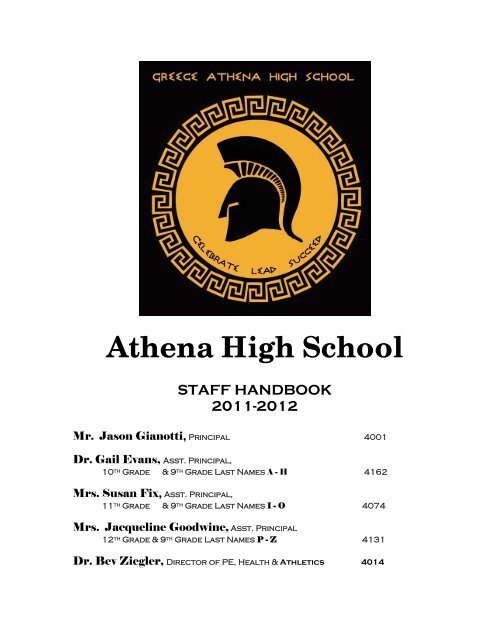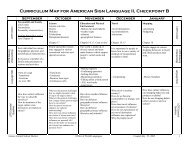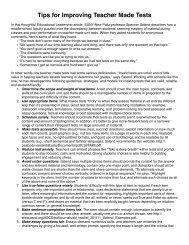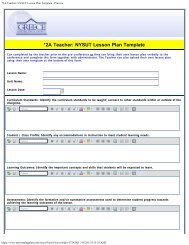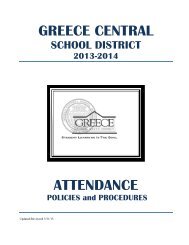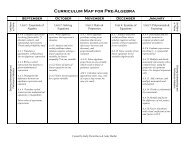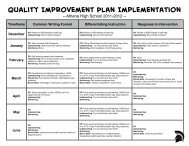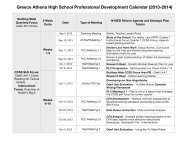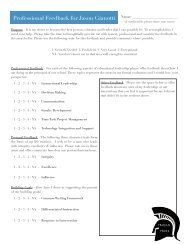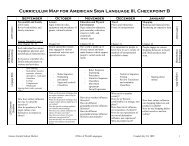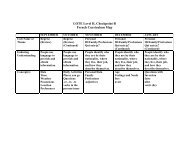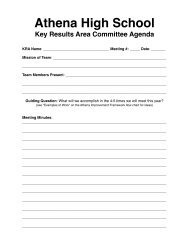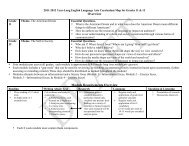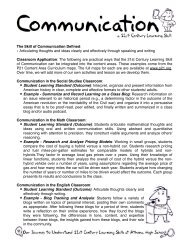Athena High School - Greece Athena Staff Blog
Athena High School - Greece Athena Staff Blog
Athena High School - Greece Athena Staff Blog
You also want an ePaper? Increase the reach of your titles
YUMPU automatically turns print PDFs into web optimized ePapers that Google loves.
Special Ed - Feeder Pattern, CSE Coordinator, Work Study Program, Self Contained,Program Reviews, Scheduling, IST, 504 Process9 th Grade TransitionStudent AttendanceTeam Leader -9 th Grade A-H4Susan Fix, Assistant Principal, 11 th Grade & 9 th Grade (last names I - O)Departments: Science, TechnologyAnnual Reviews grade level responsibilityInfinite CampusMaster ScheduleCourse Selection ProcessPLTWField TestingGrade level CSE SupportRoom Utilization<strong>Staff</strong>ingTeam LeaderJackie Goodwine, Assistant Principal, 12th Grade & 9th Grade (last names P – Z)Departments: Art, LOTE, ESOL, Business, MathAlumni RelationsYearbookAnnual Reviews grade level responsibility Senior EventsAwards CeremonySenior Parking Approval & DistributionGrade Level Annual ReviewsSpino FoundationTesting – AP, Regents, PSAT’sTeachers FirstTransportation/Field TripsTeam Leader – 9 th GradeUniversal CalendarBev Ziegler, Director of PE, Health & AthleticsHealth/FCS, Physical Education AHS & AMS,PE - District Non-tenured, Coaches Parking SupervisionDCIAPictures/Student ID’sFacility Use/APACPool Usage & SupervisionFire DrillsSecurityGame SupervisionSprit/Homecoming Week/PEP/WeekendInterscholastic Sports & Game Supervision Sports BoostersMedia LiaisonSports - Budget, Scheduling, Officials & Trans.MCPSAA Rep.Student PlannersNursesStudent SurveysMajor Responsibilities1. Implementation of the <strong>School</strong> Improvement Plan in the unit areas.2. Supervision of students in the grade level.3. Evaluation of unit teachers and support staff.4. Analysis of data and student work to improve instruction.5. Coordination with the Department of Curriculum and Instruction toimplement District and school improvement initiatives.6. Supervision of counselors, and collaboration in support of students.7. Communication with parents to promote student success.8. Co-facilitating unit and department meetings to promote instruction.9. Professional development of teachers and support staff.10. <strong>School</strong> management/operations responsibilities as assigned by the Principal.
Counselors:Teresa Bussey – A-DaMilli Lake – De-HoTammy Aubrey – Hu-MeNicole Berardo – Mi-SaDeidre Eli – Sc-Z5Black Scholars, Career/Graduation Plans, Course Selection Forms, CollegePlanning/Panels/Financial Aid, Junior & Senior Parent Meetings, NASA (New <strong>Athena</strong>Student Action), Naviance, New Visions, 9 th Grade Orientation/8 th Grade Night, PeerMediation, PSAT – Post HS options, TIG - Trauma, Illness & Grief, Web Page, WeMoCoCurriculum LeadersEach major department or Standards Area has an Instructional Leader, a teacher who isresponsible for facilitating department activities, operations, and initiatives. The InstructionalLeader is responsible to the Principal, the unit administrator, and the director or coordinatorfrom the Department of Curriculum and Instruction. Assist in the development and implementation of department goals/initiativeswithin the school improvement plan. Each department goals/initiatives need to bemonitored and evaluated through the use of student data at each departmentmeeting. Serve as a liaison between District/Building level administration and staff. Coordinate the implementation of District level assessments to teachers. Ensure all materials are returned by date and details provided by TestingCoordinator. Testing make-ups are to be organized with the support of the TestingCoordinator. Disseminate information from state and local organizations. Provide agenda and minutes to administrator responsible for the department by duedate. Provide updates on department <strong>School</strong> Improvement Plan during Faculty meetings. Meet with administrative staff on an as-needed basis. Be responsible for the inventory and budget requisition for materials necessary forcarrying out instructional program within the department. Collaborate with members of the <strong>School</strong> Improvement Team to link Department,Building, and District Goals. Participate at required monthly district level meetings.Team Leaders Collaborate with team members to determine meeting agendas Inform team members of the agenda items prior to meeting times Meet with team members at least twice a month Serve as meeting facilitator Develop and implement a system to maintain accurate records of meetings,contacts with parents, academic interventions, and behavior plans Maintain communication with team members, counselors, administrations, andfamilies
Oversee scheduling activities for their team Facilitates academic supports and interventions Facilitates the implementation of behavior plans Maintains communication with building administration6Class and Club AdvisorsClass Advisor Responsibilities1. Coordinate and communicate with Principal relative to all class activities.2. Organize and make arrangements for the election of class officers.3. Advise and meet regularly with class officers and other students to arrange and planclass activities and fund-raisers, and to be present at each activity.4. Ensure adequate chaperones and security at all class-sponsored functions.5 Request class meetings (assemblies) when necessary and ensures that such meetingsare properly organized and facilitated, during Advisement whenever possible.6. Work with the club treasurer to ensure proper management of extracurricularaccounts and all fund-raising activities.7. Coordinate group picture with yearbook.Club Advisor Responsibilities1. Coordinate all club activities.2. Organize and make arrangements for the election of club officers.3. Advise and meet regularly with club members to plan activities and competitions.4. Supervise all club-sponsored activities.5. Work with the club treasurer to ensure proper management of extracurricularaccounts and all fund-raising activities.6. Coordinate group picture with yearbook.Office <strong>Staff</strong>Ann Uruburu ext. 4043Administrative Assistant, Principal’s Office<strong>Staff</strong>ing forms, supervision, newsletters, handbooks, staff/student recognitionAnna Christopher ext. 4040 Receptionist, Main OfficeKeys, mailboxes, announcements, substitute teachers, parking permits, switchboard, District Mail,staff/parent E-mailNancy Jo Gross ext. 4160 Budget Clerk, Main OfficeExtracurricular accounts and calendar, school budget records and accounts, U.S. MailNancy Cooke ext. 4044Counseling OfficeStudent registration, transcriptsDiane Gallipeau ext. 4187 Records Clerk, Counseling OfficeReport cards, Infinite Campus, ERSSGail Cappella ext. 4052Sr. Teacher Aide, Counseling and Career CenterCollege applications, admission informationTeacher AidesTeacher aides are responsible to the Unit Administrator and Instructional Leader(s) for their area.Responsibilities1. Clerical duties, including filing, typing, and copying.2. Ordering and replacing supply inventories.3. Arranging for A/V equipment.
4. Typing and processing purchase orders and other budget-related duties.5. Maintaining student records such as attendance and grades.6. Supervision of students as assigned by administration.7. Other duties as assigned.7Teaching AssistantsTeaching assistants are responsible to the Unit Administrator, the teacher(s) with whom they workdirectly, and (if applicable) the Instructional Leader(s) for their area.Responsibilities1. Working with students to provide direct instruction under the supervision of a teacher.2. Providing instructional support for students, individually or in groups.3. Supervising labs.4. Maintaining records on student academic information, attendance, assignments, etc.5. Clerical duties such as filing, typing, and copying (when not working with students).6. Preparing new books and magazines for circulation; managing textbook inventories.7. Supervision of students as assigned by administration.8. Other duties as assigned.OfficesGrade Assist. Principal Secretary Aide Phone12, 9th last names P-Z Jackie Goodwine Paulette Inclema Kathleen Harrison ext. 413111, 9 th last names I-O Susan Fix Jeanne Attridge Marianne Walter ext. 407410, 9 th last names A-H Gail Evans Fran Palermo Jule Dieter ext. 4162II. <strong>School</strong> Practices and ProceduresAdvisement Block PhilosophyAdvisement is intended to be a time when students and teachers have the opportunity to worktogether to promote academic success. Advisement provides a chance for students to meetwith teachers to make up work missed and to receive additional academic time on task.Additionally, advisement will allow students to have the opportunity to work on homeworkassignments and projects during the school day.Advisement Schedule12:27 - 12:47 Announcements and planner checks12:47 - 12:50 Passing time to 1st appointment (3 minutes)12:50 - 1:22 32 minute appointment1:22 - 1:25 Passing time to 2nd appointment (3 minutes)1:25 - 1:55 35 minute appointment** Lavatory and Locker passes are NOT to be done during “traveling to appointment time.”Teachers will use their discretion on essential lavatory or locker passes as any other classperiod.Advisement Block Rules1. Students must report to the Advisement Block with study materials.
82. Students must obtain a pre-signed pass in class. No passes will be signedimmediately before advisement. If appointments have not been made, students willnot be released from their Advisement Room.3. If students wish to use the library during advisement, students must get a pre-signedpass from the librarians prior to advisement.4. Students will have their planner out and open when in the hallway.5. There are only two passing times during Advisement. Students who move to anappointment are expected to remain with their teacher until the next passing time.6. Students who need to contact their teachers due to extended absences can receive aspecial pass, at teacher discretion, to allow them more than two passing times. Anystudents not following the rules for Advisement are subject to a restricted pass whichlimits any movement during the Advisement period.7. Students can only buy “Food Cart” products from the classroom (not in the hall).Attendance ProceduresAttendance Offices12th Grade & 9 th Grade P-Z – Kathleen Harrison – Room 272 – ext. 416711 th Grade & 9 th Grade I-O – Marianne Walter – Room 212 – ext. 418510 th Grade & 9 th Grade A-H – Kathy Davies – Room 243 – ext. 4265A. Daily <strong>School</strong> Attendance1. The daily attendance reports and the attendance phone system calling service rely onaccurate 1 st Block attendance entries; 1 st block teachers must take accurate attendancevia Infinite Campus by 7:30 AM daily.2. Classes begin at 7:20 AM; students are tardy to class if they are not in their class bythe 7:20 AM bell. If a student arrives tardy to class, admit the student and updateInfinite Campus attendance, do not send the student to get a pass from the unit office(consequences for tardiness are described subsequently in the handbook).3. Students arriving late to school (following the 7:20 AM bell) will sign-in at thesecurity desk and be provided a pass to their unit office. The unit office will changethe Infinite Campus attendance record from absent to tardy and will provide thestudent with a pass to class.4. If there is a situation where you allow a student into 1 st Block after you have takenattendance and they did not sign-in at the unit office you must phone the proper unitoffice or remember to change the entry in Infinite Campus from absent to tardy.5. All notes for tardiness, absence, or appointment dismissal should be directed to theunit office.6. Attendance will be electronically sent daily; teachers should review the attendancelist and report discrepancies to the unit office.7. For Substitutes: Instruct substitutes to send their 1 st Block attendance to the mainoffice by 7:30 AM. Attendance for all other blocks should be taken on printed rostersto Kathy Davies (room 243) by the end of the block.B. Class attendance must be recorded IN ALL CLASSES EACH DAY, in compliancewith state school safety law and District policy. Teachers are required to input student classattendance via the Infinite Campus program. Attendance must be input via Infinite Campusby 7:30 a.m. All other attendance must be input within 10 minutes of the beginning of the
lock. Any staff members who need training on Infinite Campus should contact DianeGallipeau as soon as possible.9C. Truant from class/tardy to class - An attendance list will be provided each day andshould be used in keeping class attendance records accurate. Each teacher is expected toinspect the daily absentee list to determine whether a student is truant from class or absentfrom school. If a student is truant from class, the teacher should contact the student todetermine the reason for the class truancy. Based on the information, the teacher shoulddetermine the action to be taken, including a warning, a makeup arrangement, detention withthe teacher, phone call to parent, etc. <strong>Staff</strong> is encouraged to inform parents via phone of eachclass truancy. Referrals for truancy should not be written until you have met with the studentand contacted the parent.A student is considered tardy to class if they are not in the room at the designated time. If astudent arrives late to class admit the student (this includes 1 st block). Do not send thestudent to get a pass. The consequences for tardiness to class are: 1 st and 2 nd offense = teacher discretion (restitution, take away lav/locker passes,detain after school, etc.) 3 rd offense = teacher contacts parent and assigns administrative detention. 4 th offense = referral to administrator (ISS, Saturday school, revoking parking pass,etc.) 5 th offense = referral, administrative discretion.Other expectations: Teachers are not permitted to cancel, shorten or lengthen classes at any time. Teachers are not to release students early from class under any circumstances.Students should be working or engaged in instruction for the entire class block, and should notbe allowed to congregate at the door or in the corridor prior to the end of class. Changes in location of class must be communicated to students and to each unit officeand the main office in advance of the change and posted on the classroom door. Students should not be given passes during class time to the Cafeteria, Media Center, unitoffice, or other areas without a valid reason. <strong>Staff</strong> is reminded that the Cafeteria stop andbreakfast cart serves breakfast at 7:15 a.m. The cafeteria is closed all day, except duringBlock 3. Only the passes in the Agenda planner should be used, and they must be signed with thetime. Other than the planner, other items used as passes are inappropriate. Teachersshould take note of the student’s previous passes that day so they are not released to thebathroom or other areas repeatedly.Grading PracticesGrades should be assigned based on ongoing assessment of the student’s current progresstoward meeting the Learning Standards. Course grades should be based on a combination ofstudent work, including class work, performance assessments, common embedded tasks,projects, tests, and outside work. Grades should not be used as a management tool or topromote compliance with rules (i.e. “teaching them responsibility”). Teachers should speakwith parents for all students who receive a failing grade or for all students whose grades havefallen one or more levels.
10Numeric grades will appear on progress reports and report cards in all classes. Honorroll designations will be calculated based on the grade point average (GPA) earned persemester and will recognize three levels of achievement:95-100 <strong>High</strong> Honor Roll with Distinction90-94 <strong>High</strong> Honor Roll85-89 Honor RollThe same scale will apply to honors distinctions given to graduating seniors.Valedictory Honors will be bestowed on seniors with final cumulative averages of 95or better, Salutatory Honors will be awarded to seniors with GPAs of 90-94, and theHonors distinction will be granted to seniors with GPAs of 85-89.Conversion of Letter Grades Earned Prior to the 2011-12 <strong>School</strong> Year95 – 100 A+ 9890 – 94 A 9285 – 89 B+ 8780 – 84 B 8275 – 79 C+ 7770 – 74 C 7265 – 69 D+ 670 – 64 F 55Block Schedule<strong>Athena</strong> runs a 4-block, alternating day (“A/C and B/D”) schedule with a 4-day cycle. 1 stBlock begins at 7:20 a.m., when students are expected to be in class for school attendance.Most classes meet every other day for 83 minutes. Exceptions include Physical Education,which meets once every four days, Science lab classes, and some sections of ½-credit courses(i.e. Health). Lunch is during Block 3. All staff and students will have a 30-minute lunch,except those with special lunch classes. Bells will not ring during Block 3, so teachers areresponsible for prompt dismissal. The time schedule for 2011-12 as follows:Block 1 7:20-8:46Block 2 8:52-10:15Block 3 10:21-12:21L1 (Class Begins 10:54)L2 (Depart Class 10:51) (Class Resumes 11:24)L3 (Depart Class 11:21) (Class Resumes 11:54)L4 (Depart Class 11:51)Block 4 12:27-1:50LunchBlock 3 is the lunch block. All staff and students will have a 30-minute lunch, unlessstudents request not to have a lunch (WeMoCo or requested lunch classes only). Adhere tothe lunch times on the previous page and do not dismiss classes early for lunch.
11Building and Facility UseAnyone wishing to reserve a room for use must complete the Facility Use Form in theAthletic office. Special custodial requests and A/V needs must be indicated on the form. Wecannot guarantee room use or equipment without that form. The Athletic office maintains theFacility Use calendar. Consult this office to see whether a room is available.<strong>Staff</strong> is not permitted to be in the building when a custodian is not on duty, generally duringmost school holidays and most weekends from 4 p.m. Saturday until 6 a.m. Monday. Duringthose times, the security alarm is set, and unauthorized entry will prompt the system to soundthe alarm and contact police.Eligibility for Sports and Extracurricular ActivitiesAll students must meet the requirements of the District’s Eligibility Policy to participate. TheEligibility has been revised by the Board of Education. Coaches and advisors are responsiblefor enforcing the Eligibility Policy, under supervision of the Assistant Principal of Athleticsand the Principal. Refer to the Board of Education Policy Book for more information.Emergency Drills and Fire Drills<strong>Staff</strong> will be familiarized with the <strong>School</strong> Safety Plan, which is contained in a black binderin all unit offices and the Principal’s office. It includes District policies and schoolprocedures regarding emergencies, evacuations, and drills. All staff must also understandtheir role, responsibility, and assembly location during an evacuation.In addition, teachers and support staff are required to become familiar with the orangeTeacher Response Plan card posted in each classroom and office. Emergency evacuationplans cannot anticipate every circumstance, so the plans are meant as a guide to staff, and asprocedures to be followed barring exceptional circumstances. If you have any questions,please consult an administrator.In the event of fire, the person who discovers the situation should set off the nearest alarmand then report the location of the fire to the Principal’s office. Even though the alarm hasbeen sounded and fire trucks are en route to the school, the administrator in charge shoulddirect someone to call the Fire Department dispatcher (865-1321) to provide information onthe location and extent of the fire. At this point, emergency procedures will be in effect.During an emergency, all staff members are assigned to supervision until released by thePrincipal, including emergency situations that extend beyond the school day.During a drill or evacuation, all staff is expected to move as quickly as possible to evacuatestudents and themselves via the posted exit. Teachers are expected to move quickly to theirassembly lane and to take attendance for their group, and report it to the grade-level assistantprincipal in a timely manner. Please consult the fire drills bulletin provided to staff duringopening week.Field Trips/Extended Student TripsAll field trips must have a strong connection to course curriculum and a clear instructionalobjective. Field Trip Request Forms are available in room 272 or the main office. Request
forms are to be submitted to Paulette Inclema in room 272 no less than two weeks priorto the trip to allow for the timely transportation arrangements. Late requests will notbe accepted.Students must notify all teachers that they will be absent from class due to a field trip.Students who miss assignments or tests as a result of attending a field trip are responsible formaking up that work. The teacher sponsoring the field trip will provide all students with aField Trip Permission Form a minimum of two weeks prior to the trip. All teachers will besent an electronic version of the form. Complete shaded areas and make copies for allstudents. All forms must be completed, collected and maintained by the sponsoring teacherprior to the students attending the trip.<strong>School</strong> buses for field trips are generally available from 9:10 a.m. – 12:50 p.m. There areseveral times throughout the year when trips will not routinely be approved. They include theweek at the end of each marking period, the weeks during AP testing and the end of theschool year, as well as some District blackout dates. Consult the Field Trip Calendar in themain office or room 272 for specific dates prior to making final arrangements for a trip. Anyexceptions to these dates must be approved in advance by the principal.For extended trips, advisors should read and understand the Board of Education policies andregulations on such trips. BOE approval is required for trips in which students will miss threeor more consecutive days of instruction and/or which exceed 500 miles of travel one way.Charter busses must be on the approved list of busses. In addition, the following expectationsapply: All trips must be approved by the Principal in advance, with a detailed itinerary. No student who is otherwise eligible can be denied participation due to lack of funds. There should be at least one chaperone for every 10 students. Trip preparation must include a specific plan for supervision of students. The advisor or lead teacher is responsible for orienting all chaperones about behavioralexpectations, itinerary, school and District policies for adult and student conduct, etc. Trips must have a strong tie to the curriculum or the group/club/sport’s purpose. Phone numbers for all hotels and other venues must be provided to the Principal.12Hall Policy/Hall PassesAll students and teachers are expected to use the pass system provided in the Agenda plannerbooks, which all students receive. No student should be permitted to leave a classroomwithout a signed and timed pass in the planner. See Advisement Block andAttendance Procedures sections above.Home InstructionStudents may be home tutored for a specified period of time due to extended illness or long-termsuspension from school. Teachers are responsible for providing work to tutors through theCounseling office. Any student who appears on a class list is that teacher’s responsibility.Teachers and tutors should be in communication on a regular basis. If work is not being returnedin a timely manner, the teacher should initiate contact with the tutor and parent to ensure that the
teacher has fulfilled his/her responsibility for communication. If the tutor is not followingthrough, the teacher should contact the Assistant Principal immediately.13The student’s report card grade should reflect the completed work received. However, if aninadequate amount of work was received, a failing grade should not be assigned unless theteacher has discussed it with the counselor or administrator to determine why work was notcompleted. If the student never received the work, an NG (no grade) should be assigned until thework is completed. An INC (incomplete) should not be assigned.HomeworkAssignment of homework should adhere to a constructivist educational philosophy and thebelief that students need independent practice to help them meet the learning standards.Homework should not be assigned as a “compliance” tool. Meaningful homework providesstudents with an opportunity to construct enduring understanding of concepts, to practiceskills, conduct research, read, write, draw, or create. A good rule of thumb: If an assignmentcan be copied in the cafeteria at lunch, it is not worth assigning!Appropriate assignments may include problem solving with short answer response;interpretation of a chart or graph; writing a critical review or reaction to an article orliterature; or creating an original poem, work of art, or project. It is also acceptable thathomework sometimes will include significant practice of a skill or concept learned in class.Many students choose not to do homework because it is not meaningful, or because they donot understand how to begin. Time should be provided in class for the teacher to model thedirections, review an exemplar, and give students time to begin their homework (i.e. guidedpractice). Daily homework assignments should not count for an inordinate percentage of thefinal grade (generally less than 10 percent).Please refer to the Board of Education Policy (Attachment B)What Is PBISPBIS, Positive Behavioral Interventions and Supports, is a collaborative effort whichexplicitly defines and teaches behavioral expectations. Through PBIS, students who displayappropriate behaviors are recognized. In addition, differing levels of support are given toassist all students in meeting school wide expectations. Problem areas are targeted throughdata collection, and addressed.The PBIS team, in coordination with the entire staff, has developed three broad guidelinesfor behavior in the school: Be Respectful; Be Responsible; and Be Productive. Thesethree overarching principles have been further explained for all common areas of the school.Posters have been placed in the halls, cafeteria, classrooms, and advisements with clearlystated, positive expectations such as, “Use appropriate language and volume.” Byarticulating and posting these expectations, students and staff have a common language withwhich to discuss behaviors.
14Data collection is a critical piece of PBIS, and continues at <strong>Athena</strong> as we workcollaboratively to encourage appropriate behaviors and target areas for improvement.Through this initiative, we hope to minimize disruptive behaviors and strive for excellence inour school.For more information, please visit pbis.orgIndividualized Education Plans (IEP)All staff members are responsible for reading and familiarizing themselves with the IEP’sor 504 Plans prior to their first class with students for all classified students assigned tothem. A list of classified students and students with 504 plans as well as an IEP Direct code andpassword will be provided to teachers prior to the first day of school. Teachers are required tosign a confirmation in room 243 that they have read the IEP prior to meeting with the students onthe first day of school. According to NYS Part 200 Regulations and IDEA it is essential that theProgram Manager and classroom teachers ensure that all accommodations or modifications toinstruction, program, and assessments are provided and documented to ensure legal compliancewith the IEP. Teachers and support staff should consult on a regular basis with the student’sInclusive Education Program Manager, and provide regular, ongoing feedback on achievementto parents. A 5-week progress report must be sent home each quarter to assess progress towardsgoals and objectives. Teachers may be asked to attend IST, CSE, and annual review meetings fortheir students.Injuries/AccidentsAny accidents or injuries involving a staff member or student should be reported to:1. The nurse for emergency treatment and completion of an accident report. <strong>Staff</strong> memberswho are injured should see the nurse as soon as possible on the day of the accident to fillout necessary reporting and insurance forms.2. The student’s assistant principal or the staff member’s unit administrator should benotified. No student who is injured should be left unsupervised, and the student should beaccompanied to the Nurse’s Office if necessary. See Health Office under Section IV.Parent Communication and ConferencesIt is a professional responsibility to provide parents with ongoing, meaningfulcommunication about student achievement and behavior. <strong>Staff</strong> should be available to meetwith parents at mutually convenient times, outside the school day if necessary.Teachers are expected to: Provide ongoing feedback (written and by phone or e-mail) to parents, and to keeprecords of this communication, especially for students who have ongoing difficulties Initiate parent conferences when it is in the student’s interest Keep accurate grade and attendance records, and make them available at conferences Utilize interim progress reports which are mandatory for all students. Attend IST, CSE, and annual review meetings
Attend and participate in Curriculum Night15Parking (<strong>Staff</strong>)All staff must park in the designated staff parking area and must display the parking tag.Drivers who park in the fire lanes, handicapped spots, or unauthorized areas will be towed.See Anna Christopher in the main office for parking passes or questions.Parking (Students)Seniors who have an authorized parking permit must park in the designated student parkingarea, and must display the parking tag. Students who park in an unauthorized area or whodrive to school without permission will be towed and are subject to disciplinary action.Direct any questions on student parking to the 12 th grade Unit Office. In some uniquesituations, juniors may also be issued parking passes. This will be done solely at thediscretion of the building principal.Report CardsTeachers are responsible for the completion and accuracy of inputting student grades intoInfinite Campus at the end of each marking period and after final exams. Teachers also mustprovide any corrections on the appropriate edit sheets to Diane Gallipeau in the RecordsOffice. Diane Gallipeau will provide complete directions at the appropriate times.<strong>School</strong> Improvement PlanBased on our belief in continuous improvement, <strong>Athena</strong> each year updates the <strong>School</strong>Improvement Plan to address areas of opportunity in student achievement and school climate.The SMART Goals process is used to develop building and department goals.The <strong>Athena</strong> Improvement Team (AIT), which meets monthly, oversees implementation ofthe SIP and oversees the decision making process for shared issues delegated to the schoolcommunity. However, all staff members are responsible for contributing to the developmentand implementation of the goals and objectives in the <strong>School</strong> Improvement Plan. Usingassessment and other data, each department and PLT in the school will develop SMARTGoals each fall to address areas outlined in SIP. Each staff member will have access to acopy of his/her SMART Goals and each teacher is expected to implement specific strategiesand activities to address objectives. Copies of the entire <strong>School</strong> Improvement Plan areavailable in the main office and unit offices.Security<strong>Athena</strong>’s Security staff monitors the safety and security of the school. Security is on dutybeginning 6:30 a.m. Security monitors the main entrance, common areas, hallways,bathrooms, cafeteria, ISS, and detention room. Mike Agostinelli is Security coordinator. The
16security desk number is extension 4218. To request Security to come to a room or office inan emergency, call the main office via intercom or telephone.Smoking PolicyNew York State law and Board of Education regulations prohibit smoking anywhere on<strong>Greece</strong> Central <strong>School</strong> District policy. This includes smoking in private vehicles parked onschool property. Furthermore, the Safe <strong>School</strong>s/Safe Corridors Act, S.A.V.E. legislation, andNo Child Left Behind Act permit school authorities to prohibit smoking on all paths andwalkways that are used by students to get to and from school. Therefore, staff and studentsare not allowed to smoke anywhere on any school grounds or adjacent walkways. Wealso ask that students and staff members respect the rights and property of our neighbors.<strong>Staff</strong> members are encouraged to help monitor school bathrooms and other areas of highincidents of student smoking, to help enforce these regulations.Student Management<strong>Athena</strong> embraces a philosophy of student management that utilizes effective structure andcorrective discipline to promote positive behavior. Keys to this philosophy include: Each staff member is responsible for student behavior in and around school. It is ourcollective responsibility to supervise the corridors, bathrooms, and common areas toensure a safe and orderly environment for all students, staff, and visitors. Students respond to clear, consistent procedures, expectations, and enforcement. The teacher is the primary and most effective disciplinarian, backed by consistent andcommitted administrative support. Engaging, rigorous instruction is the most effective form of classroom management. Teachers should hold students accountable for their behavior in class through clearexpectations and consequences. Students should understand the classroom rules andprocedures. When a rule is broken, the teacher should enforce it through consequencessuch as holding the student after class, speaking with the student, detention, loss ofprivileges, parent phone call or conference, counselor visit, or other interventions. Students should not be removed from the classroom unless there is an immediate threat tohealth or safety. Under the new S.A.V.E. legislation, students cannot be removed fromclass without due process (i.e. the teacher must arrange a parent conference, reinstatementhearing, etc.) Teachers may not send students to ISS (“time out”) during class unlesspermission has been granted by an administrator or designee. When – despite repeated teacher interventions and strategies – a student displays apattern of tardiness, misconduct, or other negative behavior, the teacher should seekadministrative support and intervention. If a referral is written, it should indicate in detailwhat steps the teacher has taken (always including parental contact) to deal with thesituation prior to the referral. Simply checking “Spoke with the student” is not sufficientprior action, and will not result in administrative intervention. For major infractions (fighting, abusive language, threats, smoking, drugs, leaving campus,etc.), the student should be referred to an administrator immediately. Upon referral, the administrator will take appropriate action, and keep the teacherinformed. In addition to consequences such as detention or suspension, the administratormay request a conference with the teacher, student, and parent.
17<strong>Staff</strong> is expected to question student dress when necessary and ask the student to reportto their grade level Assistant Principal or other designated administrative staff member.Parents will be contacted to help ascertain the appropriate corrective action necessary.VisitorsState law and District policy require all visitors to report to the front desk, sign in, and obtaina visitor’s tag. Visitors also may be referred to the main office. Students are not permitted tohave guests or visitors at school, unless they receive prior permission from their AssistantPrincipal. We do not permit students from other schools to “shadow” students for a schoolday. <strong>Staff</strong> must request approval from their unit administrator to have guest speakers, preservice teacher, shadow experiences, etc.III. <strong>Staff</strong> ProceduresAbsencesAll teachers and teaching assistants must record all absences on the computer atwww.aesopeducation.com or by Aesop at 1-800-942-3767 to use the automated system. Theemployee must indicate whether a substitute will be needed. Even if a sub is not needed, theemployee must use Aesop to record the absence. Record your absence as soon as possible inorder to insure a substitute will be available. For long term anticipated absences, staffmembers must inform their unit administrator ahead of time, and then call the automated system.Note: Teacher aides and clerical support staff must obtain the Administrator’s prior approvalbefore arranging for a substitute for an anticipated absence.Absences must be recorded in the system one half hour before your start time on the day you areabsent. Lesson plans can now be submitted on the Aesop system when your absence is recorded.Attendance Folders with instructions should be available in your room or unit office for thesubstitute to use. It is recommended that all teachers keep a substitute file in their unit office,including updated class rosters, teacher schedule, Advisement roster, fire drill information, andat least one all-purpose sub lesson plan for emergencies. If you anticipate being tardy, pleasecontact school.Substitute Teacher Infinite Campus ProceduresTo ensure the security and accuracy of Infinite Campus, the following protocol must befollowed:Substitute teachers: Due to security and accuracy concerns, teachers cannot share theiruser name and passwords with substitute teachers. Teachers have to provide subs with papercopies of their class rosters to record attendance manually. The completed class attendancerosters must be delivered to the attendance clerk each day.Sub assigned five or more consecutive days to one teacher: The school administrator canrequest this access by sending an email to Lorraine Thompson or Maureen McNelis. A start
18and end date needs to be included in the email. Access will cease at the end of theconsecutive days. Access will only be granted if the sub has been trained on how to use IC.Long term sub assigned to one teacher: If the sub’s name does not appear on theEmployee Tracking System (ETS) and that sub will be the long term sub assigned to oneteacher, the school administrator can request access by sending an email to LorraineThompson or Maureen McNelis. A start and end date needs to be included in the email.Access will cease at the end of the assignment. Access will only be granted if the sub hasbeen trained on how to use IC.Depending on certain situations such as a long term sub, the building coach/scheduler willneed to add the sub’s name to the courses as a second teacher so the sub can enter attendanceand gradesTraining: A long term sub will need to schedule IC training with either Jerry LaMonica orJoe Lombardo before they are granted access to IC. This can be arranged during the days thesub is working with the teacher before he/she leaves.Copy RoomCopy requests should be submitted at least one week in advance and requests are filled inthe order they are received. All staff is welcome to use the copiers. Employees are urged toconserve paper and usage as much as possible by copying on two sides or by providing classsets, limiting the copying of large packets. Large amounts of copying should be sentelectronically or by interoffice mail to the Imaging Center. Forms are available in the copyroom. <strong>Staff</strong> members are also reminded to respect all copyright laws. Students are notpermitted to use copiers.Custodial RequestsCustodial services or repairs should be requested in writing (forms are available in the mainoffice) and given to the unit administrator. If an emergency situation arises, contact thecustodial office at extension 4032 or the main office at 4001. Please inform your unitadministrator of any broken tables, chairs, or other equipment.E-mailSubstantial information is communicated via the <strong>Athena</strong> staff blog. All staff members mustget in the routine of checking their e-communication at least once per day as they do theirmailbox in the main office. Please join the <strong>Athena</strong> parent email for announcements by e-mailing Anna Christopher.Keys<strong>Staff</strong> members needing keys should see Anna Christopher in the main office. <strong>Staff</strong> membersare required to turn in all keys in June. Master and outdoor keys will not be issued to staff. Itis unlawful to duplicate school keys, so no keys should be duplicated. Students should not beallowed use of staff keys at any time.
19Leaving the Building<strong>Staff</strong> members must get approval from their unit administrator before leaving thebuilding during the school day and must sign out at the reception desk in the mainoffice and check in there upon returning. <strong>Staff</strong> members are not allowed to leave duringtimes when they are assigned to supervise students without getting approval and coverage.MailboxesEach staff member has a mailbox in the main office. <strong>Staff</strong> members are expected to checktheir mailbox at least once per day. Students should not be sent to get mail from a staffmailbox. They can be sent to Anna Christopher, the school receptionist.P.A. AnnouncementsDaily morning announcements will be limited to 7:15-7:20 a.m. Regular schoolannouncements will be made during the first 10 minutes Block 4 A/C days. Announcementforms available in the main office. Forms must be submitted by 12 p.m. the day theannouncement is to be made.Personal Days<strong>Staff</strong> members who are requesting a personal day must record the personal day via Aesop.The principal will automatically be notified of your personal day request via email.Confirmation will then be completed via email.Professional Performance ReviewAll teachers and support staff will receive a written annual evaluation. Teachers and teachingassistants will be evaluated according to the Professional Performance Review criteria. Thisevaluation will be based on formal and informal observations by building and Districtadministrators, and feedback will be provided for each of the domains in the PPR document.Administrators will conduct formal observations and informal walk-throughs on a regular basis.Sensitive FilmsPer District policy staff members must get the Principal’s permission to show R-rated moviesin class. Any R-rated or PG-13-rated movies must have a strong instructional justification tobe shown in class or for extra credit outside school. Parental consent is required, and analternative must be made available for families wishing to opt out. District Guidelines andPrincipal and parent authorization forms are available in the main office. Instructional
connection for movie clips longer than 10 minutes should be discussed with the buildingprincipal.20<strong>Staff</strong> Lounge<strong>Staff</strong> members are welcome to use the staff lounge. A refrigerator, a computer, and a phoneare available in the staff lounge. These facilities are for staff use, and students are notpermitted in these rooms.Focus MeetingsEach Tuesday afternoon is reserved for meeting time that extends the school day by onehour. A meeting schedule is provided in the opening packet. Meetings begin promptly at 2p.m. and end at 3:15 p.m. All teachers are expected to attend focus, department, PLT andother Tuesday meetings. All support staff are welcome to attend. Review classes, extra help,clubs, class council, sports, and music activities should not be scheduled on Tuesdays duringthis time.Student TeachersTenured teachers are encouraged to accept student teacher placements when requested by thePrincipal. However, teachers should arrange for student teachers only through thePrincipal, using the official District form. If colleges contact teachers directly, the teachershould ask the college to contact <strong>Greece</strong> Central’s Department of Human Resources. Studentteachers should not be used as substitutes unless they have gone through the District’ssubstitute hiring process, and have the approval of their college. Sponsor teachers shouldintroduce their student teacher to their unit administrator and the Principal, as well as at astaff meeting.Some guidelines for sponsor teachers that will help to make for a successful experience: Utilize planning time productively to help the student develop planning and teachingstrategies. Sponsoring a student teacher should be hard work, not a mini-vacation; Assign the student some instructional duties immediately upon his/her arrival; Encourage the student to observe other teachers in the department and school, and to befully involved in school activities, meetings, and events; Allow the student creativity in instructional strategies within the standards andcurriculum; Model professional behavior and dress, and keep the student away from “negative”influences; Assist the student with his/her career planning and job search; Encourage the student to request an observation from an administrator; Discuss with the Principal whether the student has potential for employment in <strong>Greece</strong>.Sunshine Club<strong>Athena</strong>’s Sunshine Club is dedicated to sending a small token of wishes at times of need orcelebration to those people who join. Membership is facilitated by Anna Christopher.
21Supplies and RequisitionsEach department Instructional Leader is responsible for ordering supplies for the department.Teachers should speak with the Instructional Leader to request supplies. All requisitions areprocessed through the department’s unit office.Textbooks<strong>Staff</strong> members must use only books and supplemental materials that are on the District’sApproved Textbook and Materials Lists. Copies of the lists are available in theAdministrator’s office. For information on how to get a new text approved, consult theGCSD Policies and Regulations folder on your computer.When issuing textbooks and other materials, teachers are required to record the text numberand issuing condition. At the end of the year, all texts and materials should be collected, andthe condition noted. Students/parents are responsible for all missing lost or damagedtextbooks that the teacher can document, and the teacher must complete a lost textbook form.Failure to pay for lost or damaged items may result in withholding of report cards, diplomas,and transcripts.Work DayEvery effort will be made to respect and adhere to contractual agreements in the planning ofour school schedule, supervision assignments, etc. As professionals, we also understand thatour responsibilities may occasionally extend beyond the contractual work day.Academic Day: 7:20 - 1:50Some students will take an additional class from 1:55 to 2:35.Teachers: 7:15 - 2:15 (Tuesday: 7:15 - 3:15)Teaching Assistants and Teacher Aides: 7:00 - 2:30Secretaries: 7:00 - 3:00All staff members who work with students are expected to be at school prior to theirstudents’ arrival, and to work with students outside the academic day when needed. <strong>Staff</strong> isalso expected to be visible and to supervise the area outside their rooms prior to the start ofschool, during passing times, and at dismissal. Unless in a scheduled meeting, teachers areexpected to be available to work with students from 1:50 to 2:15 p.m. each day.IV. Student ServicesAgenda PlannerEach student will be provided with an Agenda planning book. This planner includes thestudent handbook pages (policies, procedures, services), calendar pages for recordingassignments and work, as well as the hall pass system. All students and teachers are expectedto use the planner for the pass system. (See Advisement Block, Hall Policy/Hall
Passes). Students who lose their planner will be required to purchase a new one in themain office for $5.00.22Teachers are encouraged to familiarize themselves with the pass pages so that they can signstudents in/out and monitor pass usage. Each faculty member will receive an Agendaplanner.Teachers will use a sign-in/sign-out sheet for monitoring students’ movement duringAdvisement.Counseling and Career CenterThe Counseling Office is located in Rooms 107/109 and maintains official records andtranscripts and is also responsible for student report cards. The Career Center is adjacent tothe main office (100A). Students may utilize its computers and other resources for career andcollege planning. Students may get a pre-signed pass to visit the Counseling and CareerCenter during Advisement block, or may visit before or after school. Mrs. Cappella workswith seniors on college and scholarship applications.Each counselor works with one section of the alphabet and has an office in the CounselingCenter. Students will be assigned to counselors in 2011-12 as follows:A – Da:De – Ho:Hu – MeMi – Sa:Sc-Z:Teresa BusseyMilli LakeTammy AubreyNicole BerardoDeidre EliThe counselors are responsible for student scheduling, academic support, and socialdevelopment. Counselors are available to work with other staff to support students who arehaving difficulty with behavior, attitude, or achievement. Counselors are also involved inpresenting information in-class on course selection, careers, and college planning.Extracurricular Activities/Fund-Raisers<strong>Athena</strong> has a variety of extracurricular clubs and activities. <strong>Staff</strong> members are encouraged toattend and support club events. Students must meet the District’s eligibility policy. To findout about any openings for club advisors, or to propose a new club or activity, please consultthe main office and submit an Extra Curricular Event form.Club, class, and activity advisors and sports coaches are responsible for supervising the clubtreasurer and extracurricular account. The advisors should work closely with Nancy Jo Gross(school budget clerk) in the main office to keep accurate records of club accounts and allstate tax forms. Before any fund-raising activity, the advisor must meet with Nancy Jo tosecure a permission form and set the date to make sure it does not conflict with other schoolfund-raisers. A publication describing all extracurricular activities will be distributed to allstaff, students and parents.Health Office (Nurse)
The Health Office is located in Room 105, across from the main office. Any studentwishing to go to the nurse must get a pass. If a student is missing from class and not on theschool attendance list, teachers should check to see if the student was with the nurse. Thenurse and the principal (or his designee) are the only staff members who are authorized toadminister medicine (prescription or over-the-counter) to students. Notes from doctorsrequesting that students be excused from an activity must be immediately directed to thenurse.Interscholastic Sports<strong>Athena</strong> participates in a variety of interscholastic sports and athletics. <strong>Staff</strong> members areencouraged to attend sporting events to show their support for students and school spirit. Allstudents who participate in sports are expected to meet the District’s eligibility requirements.Coaches are required to circulate rosters to all staff at the beginning of the season. Teachersshould provide feedback on attitude and achievement. To find out about coaching and gamesupervision opportunities, please see Bev Ziegler.LockersStudents will be assigned locker numbers and combination on the first day of school, if theydon’t already have one. For locker security, teachers should encourage students not to sharetheir combination with anyone else. The student is responsible for the cleanliness andcondition of his/her locker, as well as the security of the locker combination. Lockerassignments and combinations are kept on file in the unit offices.Media CenterThe Library Media Center is located on the second floor, and is open Monday-Friday from7:00 a.m. to 3:15 p.m. Students must have a pass to be in the Media Center, unless they arewith a teacher or class. Students may obtain a pre-signed pass in their planner in the morningto visit the Media Center during Advisement or lunch. Students must have a pre-signed passin the planner to go to the Media Center.Students must use their student number to check out materials or to access the Internet. Studentswho violate the District’s Acceptable Use Policy will not be allowed to use the Internet.Trojan CornerTrojan Corner, our school store, is located in the Cafeteria, and is open during lunch periods(Block 3). Students may work in the store as part of a Business class or club. The store sells avariety of snacks, school supplies, and <strong>Athena</strong> gear.23ATTACHMENT ABoard of Education Regulation – 8290RGrading Practices
241. Teachers' grading practices shall be clearly communicated in understandablelanguage to students and parents or guardians in writing at the beginning of the course.2. Teachers shall use a criterion-referenced approach to determine grades (i.e., comparingstudent work to clearly defined learning standards) rather than a norm-referencedapproach (i.e., comparing students to each other or ranking student performance toassign grades).3. Teachers' practices associated with homework and its role as a factor in determining astudent's grade shall comply with regulation 8440R.(Appendix C)4. Students shall be afforded every opportunity to make up work that was missed due toabsence within reasonable time limits established by the teacher; these time limits,which may vary depending on the kind or quantity of work missed, will becommunicated to both parents and students.5. Teachers shall use criteria to ensure that classroom assessments meet standards ofquality and are used as tools for promoting learning, rather than simply measuring it.These criteria are as follows:Quality assessments shall incorporate a variety of methods and formats, and fulfillone of three clearly defined purposes:– Diagnostic assessments are used before teaching to gauge students' priorknowledge or skills and help the teacher to make decisions in designinginstruction; diagnostic assessments should not be used in the calculation of agrade.– Formative assessments are used throughout the instructional process to gatherdata about students' developing proficiency with knowledge and skills and to helpthe teacher make instructional decisions and tailor instruction to students' needs;formative assessments should be used to provide students with feedback on theirprogress and may be used in the calculation of a grade, but should be weightedproportionally to the summative assessment to which it leads.– Summative assessments are used at the end of a period of instruction and shouldprovide students with an opportunity to apply and demonstrate the knowledge andskills they have developed as a result of the instruction; summative assessmentsshould be used to provide students with feedback on the extent to which they havemet the standards for the unit and they should be used in the calculation of agrade.Quality assessments shall be clearly aligned to specific skills and concepts insupport of the learning standards and should provide an accurate measure of theseskills and concepts.Quality assessments shall be evaluated using clear criteria that are shared withstudents prior to the assessment so that they understand the standards of qualityrequired for a successful product or performance.Quality assessments shall be designed to avoid, to the greatest extent possible,sources of bias and distortion that can cause a misinterpretation of studentachievement (e.g., questions that are biased on the basis of gender, race, or class;results that are compromised by test-taking conditions, or unclear directions;performance that is impacted by a lack of alignment between the instruction andthe assessment).
256. Teachers shall only use formative and summative assessments to derive a tentativecomposite grade for a marking period. Teachers shall also abide by the followingfactors in determining a student's grade:Where repetitive measures are made of the same or similar skills and concepts,teachers may use a more recent mark or marks to replace the previous marks forgrade determination.Teachers will provide students with multiple opportunities to demonstrate theirability to meet the learning goals, and the highest or most consistent score can beused as the basis for the grade instead of an average of the multiple assessmentattempts.Teachers shall use their professional judgment to determine whether or not astudent has met the standards for a particular marking period; in instances where ateacher overrides a computed average based on the above considerations, theteacher shall confer with the principal and/or assistant principal and the basis forthis change shall be recorded in writing and kept on file in the principal's office.7. Teachers shall keep clear and updated records of student performance, including resultsfrom diagnostic, formative, and summative assessments, as well as other assignmentsand these records shall be available for review by administrators and shall be shared,when appropriate, with parents/guardians. Teachers shall report student progressrelative to both academic achievement and life skills to parents in writing every fiveweeks, and teachers shall inform administrators and parents/guardians of students whoare in jeopardy of failing at the time the concern arises.8. Teachers shall discuss assessment with students, in an age appropriate manner, at thebeginning of the instructional process. Where feasible and appropriate, students shall beinvolved in decisions about methods of assessment, scoring scales, and relative weightof the assessment toward determining the grade. In the case of large-scale projects orassignments with multiple steps required for successful completion, teachers shallprovide students with checkpoints for completing various components of theassignment, and the teacher shall communicate any concerns about a student's progressto the student's parent/guardian at the time the concern arises.9. At the high school level, final exams shall constitute 20% of the course grade. In thecase where Regents exams constitute the final exam for a course, they will onlyconstitute 20% of the course grade if the exam is intended to measure the skills andconcepts that are specific to that course; in the case of comprehensive Regents exams,which measure skills and concepts developed over several years, the exam score willnot be factored into the course grade but a different District-developed final assessmentmay be used and shall constitute 20% of the course grade. In the case of semestercourses, final exams will also constitute 20% of the course grade. At the middle schoollevel, final exams will constitute part of the fourth quarter gradeATACHMENT BHOMEWORKThe Board of Education supports the assignment of homework to students in order toreinforce and supplement classroom instruction as a means to ensuring student success in
26meeting the New York State Learning Standards and performance indicators. In addition,homework supports the learning process of students by teaching responsibility andencouraging the development of strong and effective work habits.General Guidelines1. Homework shall result in reinforcement of student learning that has been introducedin the classroom. It is designed in many cases to provide students with opportunitiesfor the practical application and synthesis of classroom instruction. Variety andstudent choice are highly desirable.2. Homework shall be geared to students' needs, abilities, and identified learning style,with assignments that are meaningful, creative, and challenging.3. Homework assignments shall always be given with an established instructionalpurpose and never given as a form of punishment. Four types of homework include:a. Practice: helps students master skills and reinforce in-class learningb. Extension: helps students take what they learn and connect it with real lifec. Preparation: prepares students for an upcoming lesson or unitd. Creative: helps students integrate multiple concepts (possibly from more thanone curricular area); often presented in the form of long-term projects4. Although the design of individual homework assignments is left to teacherdiscretion, in general, teachers shall communicate:a. how the homework is related to the topic under studyb. the purpose of the assignmentc. how the homework might best be completedd. suggestions for preparation, organization, and time expectationse. what the student needs to do to demonstrate completion5. The homework requested shall require the use of resources that are reasonablythought to be accessible or obtainable by each student involved.7. Assignments should consist of task/activities which students can reasonably completeon their own with a high degree of success.8. Accommodations in homework expectations shall be made for various lengths ofstudent absences.Communication1. Directions, instructions, due dates, and methods of review of homework by theteacher should be clearly communicated to the student, preferably in writing so that itmay be shared with parents. A consistent, easily seen location should be used to postassignments.2. Students absent from school should contact the teacher to discuss make-uprequirements and assistance.3. Students and parents should communicate with the teacher whenever confusion orproblems about homework arise.4. Students are individually responsible for completing their own homeworkassignments. However, when group or partner-work is advised for assignments,teachers should communicate the directions and expectations clearly, preferably inwriting, so that it may be shared with parents. Whenever possible, parents shouldreceive advance notice to plan student transportation.
5. Teachers should communicate with students and parents (counselor and/oradministrator if advisable) whenever students are not completing homework or arehaving any problems with homework.6. Parents should be encouraged to create a home environment that facilitates studentself-study.General Time Requirements1. It is important to consider the age, maturity level, work habits, and abilities of thestudents. According to abilities and learning style, students will take varying amountsof time to complete homework.2. The frequency of homework across a week and year shall be determined by theteacher on the basis of its appropriateness and necessity for instruction in the subjectarea.3. Duration of homework increases from the primary grades, where 15 - 30 minutes ofdaily homework could be appropriate, through high school, where a total of 1 - 3hours of homework per night would be reasonable.4. Support and scaffolding in the area of time management shall be provided by theteacher when long-range assignments are given to students.5. It is the student's and/or parent's responsibility to communicate with the teacher whenthe student needs more time to complete an assignment. The teacher shouldreconsider the value and appropriateness of the assignment for this particular studentand may make adjustments as needed.Role in AssessmentDefinitions: Diagnostic assessments are used before teaching to gauge students' priorknowledge or skills and help the teacher to make decisions in designinginstruction.Formative assessments are used throughout the instructional process to gatherdata about students' developing proficiency with knowledge and skills and tohelp the teacher make instructional decisions and tailor instruction to students'needs.Summative assessments are used at the end of a period of instruction andshould provide students with an opportunity to apply and demonstrate theknowledge and skills they have developed as a result of the instruction.271. Homework shall be used to assess the success of teachers’ lessons in order to planfuture lessons and the support needed by individual students.2. Review of homework by the teacher to monitor student progress and achievement isessential.3. Teachers shall provide students with regular and specific feedback on homework,identifying for them their strengths and accomplishments as well as their needs.4. At the elementary level, homework is not to be factored into a student's rating. Itshall be completed for the purposes above and as a formative assessment that canprovide feedback for the learning process. In addition, it shall provide evidence of
28work habits and attitudes that are necessary for progress toward meeting academicgoals.5. At the secondary level, homework that constitutes practice should not be factored intoa student's grade, but should be used to provide students with feedback on theirprogress toward meeting academic goals. Homework that constitutes a formativeassessment may be factored into a student's grade, but should be weightedproportionally to the summative assessment to which it leads. Homeworkassignments that constituent part or all of a summative assessment should be factored intoa student's grade. Teachers shall provide the appropriate supports and sufficient time topromote homework assignments that are proportional to other assignments and courserequirements, and that penalties associated with missing or late assignments are notexcessive and do not create a disincentive to learn.Role of <strong>School</strong> Administrators1 <strong>School</strong> Administrators communicate the district’s policies and regulations to staff andparents.2 The school Principal is responsible for overseeing the coordination of homeworkassignments among staff members so that demands on a student are maintained at areasonable level across a week and a school year.


